Steeped in the digital complexities of our day, Zoho has emerged as a luminary beacon in the realm of integrated web-based business tools, adept at stitching together a tapestry of software solutions that revitalize and streamline organizational tasks.
However, like the multiple facets of a diamond catching the light, a dazzling array of alternatives is waiting to be explored, each promising a unique blend of functionality and efficiency.
In this article, we embark on a technological odyssey to unearth the top 10 Zoho alternatives and competitors of 2023, patiently sifting through the crowded landscape of business software providers.
We will delve into these worthy competitors’ core features, pricing structures, and unique selling propositions, painting a comprehensive picture of the business software ecosystem.
Quicklist
- Onethread: A suite of cloud computing, productivity, and collaboration tools, developed by Google that allows for seamless team collaboration.
- Salesforce: A robust CRM platform that offers extensive customization and integration options.
- Microsoft Dynamics 365: A suite of ERP and CRM applications designed for seamless business management.
- HubSpot: An all-in-one inbound marketing, sales, and CRM platform, known for its user-friendly interface.
- Pipedrive: A collaboration hub that brings the right people, information, and tools together to get work done.
- Freshworks CRM: A customer engagement platform that brings together every customer conversation into one centralized interface.
- Britix24: A project management tool that helps teams orchestrate their work, from small tasks to strategic initiatives.
- SugarCRM: A collaboration tool that organizes your projects into boards, lists, and cards to prioritize work in a flexible way.
Our reviewers evaluate software independently. Clicks may earn a commission, which supports testing. Learn how we stay transparent & our review methodology
Onethread – The Best Zoho Alternative
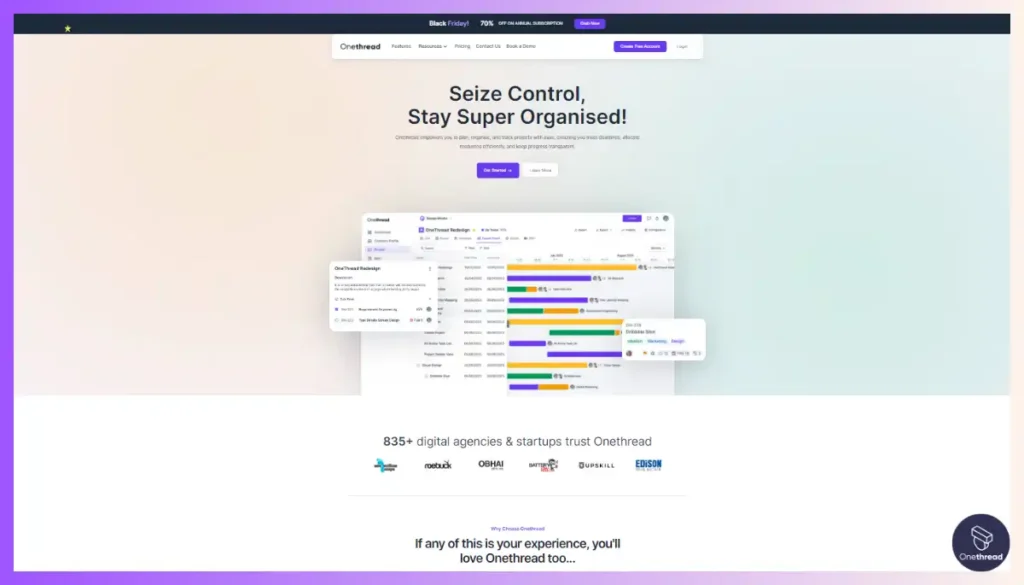
Onethread has carved out a niche in the digital realm as one of the most formidable alternatives to Zoho. Brimming with state-of-the-art features, it has managed to create a symphony of seamless workflows and systematic organization, forming an intricate tapestry of business functionalities that effortlessly match, if not surpass, the offerings of Zoho.
Starting with Onethread’s project management capabilities, users are treated to an advanced suite of tools that foster a high degree of collaboration and efficiency.
Unlike the traditional structure in Zoho, Onethread’s approach allows for an intuitive, flexible project organization that ensures each task, no matter how minuscule, is taken into account, encouraging accountability and enhancing productivity.
Diving into the realm of customer relationship management (CRM), Onethread has made substantial strides in providing an all-in-one platform that can handle every aspect of customer interactions.
By focusing on the intersection of user experience, robust functionalities, and adaptability, Onethread manages to carve out a distinctive identity in the realm of business software solutions.
Advanced Project Management
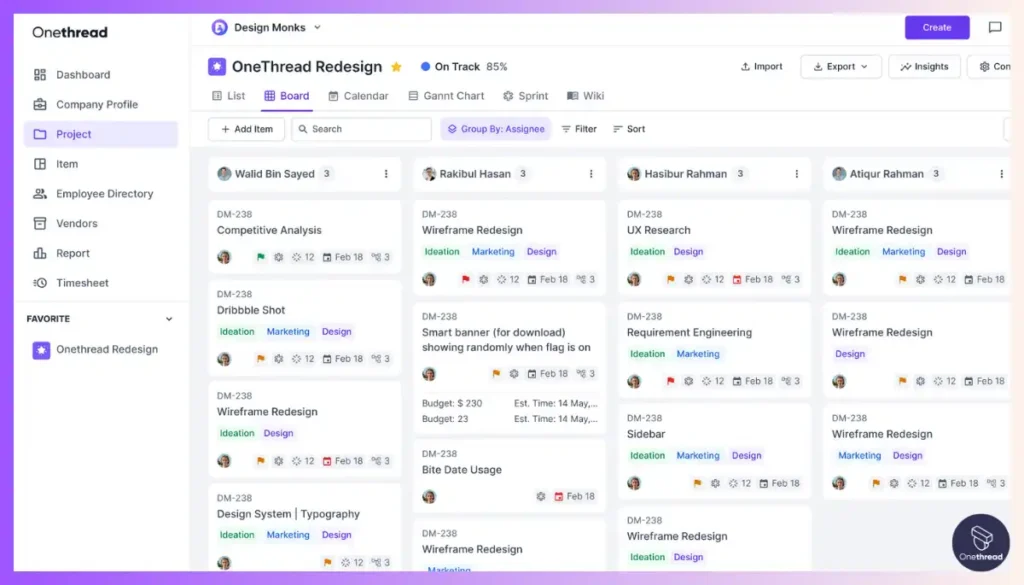
Onethread’s project management module is designed to handle complexity with ease. It fosters a high degree of collaboration and transparency, empowering teams to keep track of each task, manage deadlines, and prioritize projects with utmost efficiency.
It surpasses Zoho’s offering by allowing for a more intuitive and flexible project organization that caters to the diverse needs of modern businesses.
Vendor Managament
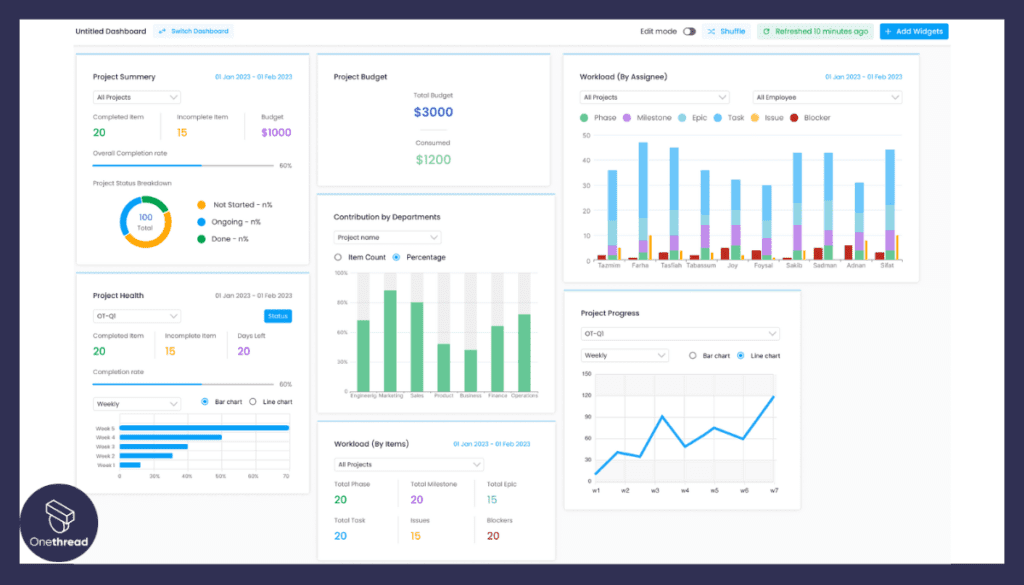
It serves as a centralized information hub where all vendor data is accessible and manageable. Real-time tracking and reporting allow for immediate insights into orders and performance, while compliance management ensures adherence to regulations.
The system’s ability to integrate with existing tools, coupled with customization, ensures a fit with specific business processes. Security measures keep vendor information safe, and support and training are readily available.
Customizable Interface
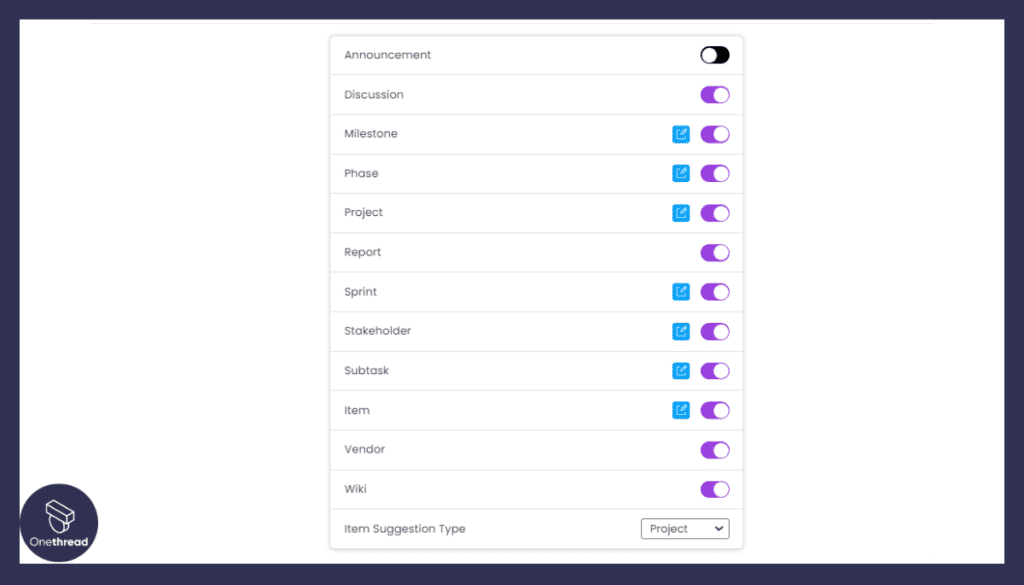
One of the notable aspects where Onethread scores over Zoho is its highly customizable interface. With myriad options to personalize dashboards, reports, and workflows, it ensures your software solution is tailored to your business’s specific requirements.
This feature accentuates the tool’s flexibility, making it a worthy contender in the Zoho alternative space.
Transparent Pricing
Onethread’s pricing model is straightforward and flexible, catering to businesses of all sizes. Its clear-cut packages offer a range of features without hidden costs, providing businesses with an affordable alternative to Zoho, without compromising on quality or range of functionalities.
Exceptional Customer Support
Onethread’s commitment to providing a smooth user experience is reflected in its 24/7 customer support. With prompt and professional service, Onethread ensures any technical issues or queries are addressed swiftly, giving it an edge over Zoho’s customer service.
Bursting with innovative features, Onethread is a potent blend of efficiency, user-friendliness, and adaptability. It makes a robust case as an alternative to Zoho, offering businesses a holistic software solution tailored to their needs.
Onethread Vs Zoho: A Quick Comparison
Here’s a quick comparison chart illustrating the key differences and similarities between Onethread and Zoho:
Feature | Onethread | Zoho |
Thread-based Task Management | ✓ | ✗ |
Gantt Charts | ✓ | ✓ |
Collaboration & Sharing | ✓ | ✓ |
Customizable Project Templates | ✓ | ✗ |
Time Tracking | ✗ | ✓ |
Integrated File Sharing | ✓ | ✓ |
Role-Based User Permissions | ✓ | ✓ |
Third-Party Integrations | ✓ | ✗ |
Platforms
Web-Based, Windows, Mac, Mobile Platforms (iOS and Android)
Pricing Plans
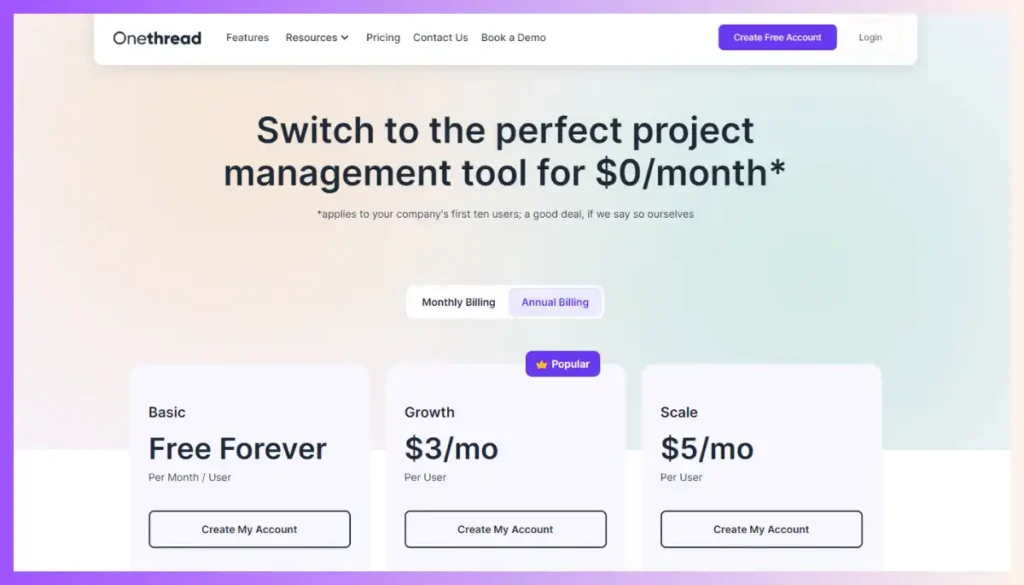
Recognizing that different businesses have varying needs, Onethread offers a series of pricing plans designed to cater to organizations of all sizes.
Starter Plan: Aimed at small businesses or startups, the Starter Plan offers basic project management and CRM features with limited customization options. This is ideal for businesses taking their first steps into the world of digital solutions.
Growth Plan ($3.6): A step up from the Starter Plan, the Growth Plan offers a broader range of features, including advanced project management and CRM functionalities, enhanced customization options, and premium customer support. This plan is designed for businesses looking to expand and manage larger teams.
Scale Plan ($6): The Scale Plan is designed for large or rapidly expanding businesses, offering the full range of Onethread’s features without limitations. This includes all vendor management tools, unlimited integrations, premium support, and access for an unlimited number of users. The Scale Plan provides a comprehensive solution for businesses that need an extensive and fully customizable vendor management system.
What Is Zoho And Why Is It Used?
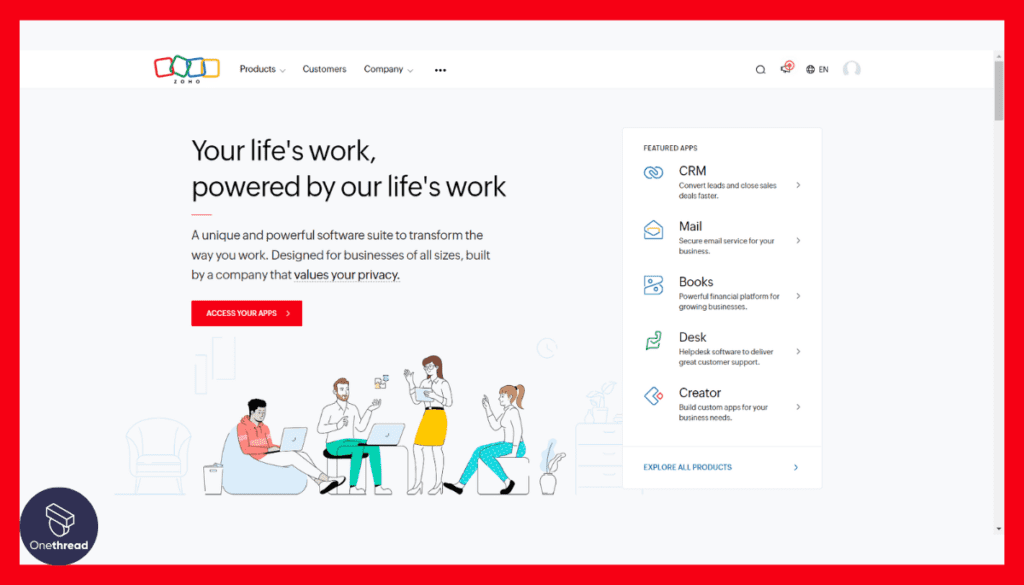
Zoho Corporation is a SaaS company that offers a cloud-based suite of applications designed to help businesses boost productivity and manage their operations more effectively. Established in 1996, the company has grown from a startup to a global entity serving tens of thousands of customers worldwide, with offices in numerous countries.
The company’s flagship product is Zoho Office Suite, a comprehensive set of business applications that can be used independently or in combination to manage various aspects of a business.
Here are the key components of Zoho and their uses:
Zoho CRM: This is a customer relationship management system that helps businesses manage their interactions and relationships with customers and potential customers. It’s used for tracking sales, managing customer data, forecasting trends, and maintaining customer communication.
Zoho Projects: This is a project management tool that assists teams in planning, tracking, and collaborating on projects. It’s used for task assignments, time tracking, reporting, and document management.
Zoho Mail: Zoho Mail is an ad-free business email solution that is used for secure, encrypted email hosting. It also provides integrated calendars, contacts, notes, and task apps.
Zoho Books: This is an accounting software that is used for invoicing, expense tracking, inventory management, and balance sheet reporting.
Zoho Desk: This is a help desk software used for managing customer support tickets, automating routine support tasks, and improving customer service efficiency.
Zoho People: This is a human resources (HR) tool that is used for managing employee information, tracking leave, attendance, and handling performance appraisals.
The appeal of Zoho lies in its comprehensive, integrated approach. Businesses can use multiple Zoho apps to create a fully-integrated system covering many operational aspects. By doing so, they can achieve high interdepartmental coordination and operational efficiency. As of my knowledge cut-off in September 2021, Zoho was used by many businesses worldwide across a range of industries.
Why Search For Zoho Alternatives?
While Zoho offers a comprehensive suite of business applications, it may not be the perfect fit for every organization. Here are some reasons why businesses may be interested in exploring Zoho alternatives:
Specific Business Needs: Zoho offers an extensive range of applications, but there might be specific features or capabilities that some businesses require that Zoho does not provide. Companies with specialized needs prefer a tool that aligns more closely with their unique business processes.
Pricing: While Zoho provides a tiered pricing model to cater to various sizes of businesses, some organizations may find it expensive, especially when scaling up. Other platforms might offer similar features at a more competitive price point.
Ease of Use: Although Zoho strives to be user-friendly, the vast number of features and apps can sometimes make it complex to navigate. Some businesses prefer a more streamlined and intuitive interface.
Integration with Other Tools: While Zoho does offer integration with other tools, the list may not cover all the software a business uses. Alternatives might offer better integration capabilities with an existing software ecosystem.
Customer Support: Zoho provides support to its users, but the response time and effectiveness may not be up to the mark for some businesses. Other alternatives offer superior customer service and support.
Customizability: While Zoho offers a certain degree of customizability, it might not be enough for businesses with very specific needs. Other tools offer more flexibility in terms of customization.
So, even though Zoho is a robust and comprehensive business suite, depending on individual business needs and preferences, companies might choose to explore other alternatives available in the market.
Other Alternatives To Zoho With Details
When considering alternatives to Zoho, there is a diverse array of productivity suites and specialized tools available to cater to the unique needs of businesses and individuals. Let’s explore some of the most noteworthy alternatives in detail:
#2. Salesforce
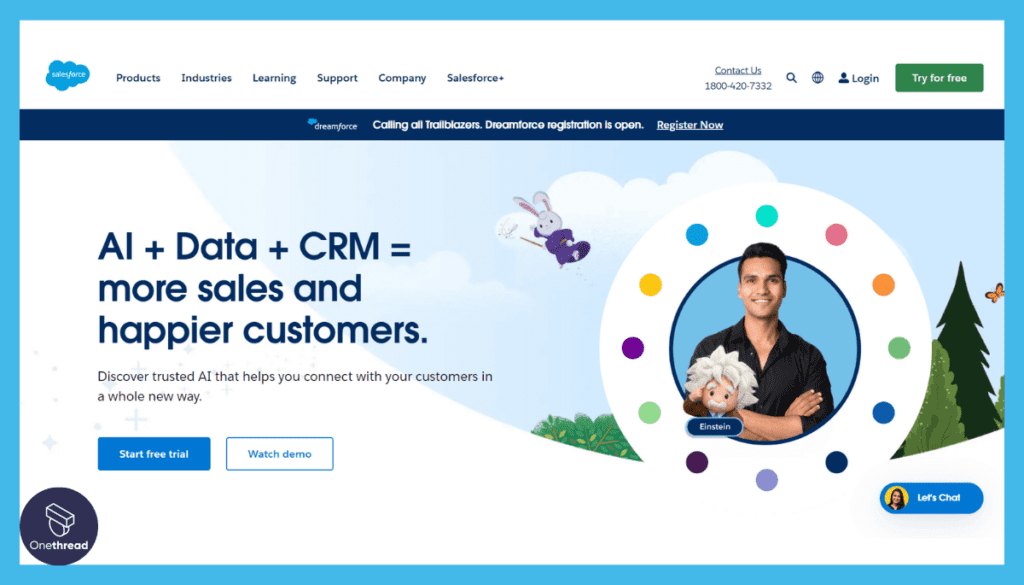
Salesforce is a renowned cloud-based CRM platform that offers a wide range of solutions to streamline sales, marketing, and customer service processes for businesses of all sizes and industries. It provides comprehensive tools for lead management, sales forecasting, marketing automation, and customer support. Here’s a detailed look at Salesforce’s features, customer ratings, and reviews.
Its robust integration capabilities allow connection with various third-party applications, enhancing flexibility and efficiency. Through intuitive dashboards and reporting tools, businesses can gain insights into customer behavior and preferences, driving more personalized experiences.
Salesforce’s scalable solutions cater to businesses of all sizes, enabling them to grow and adapt in a constantly changing market. Its emphasis on innovation and customer success has made it a prominent choice in the CRM industry.
Features:
Sales Management

Salesforce provides a comprehensive suite of tools to manage leads, opportunities, accounts, and more. Automation features enhance efficiency in sales processes.
Marketing Automation
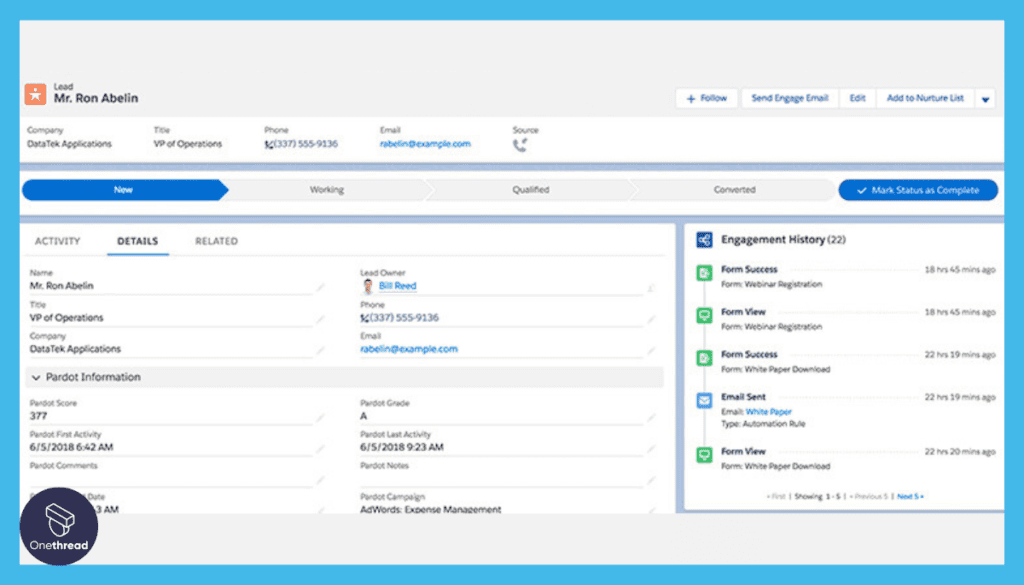
With Salesforce Marketing Cloud, businesses can automate marketing tasks and manage campaigns across multiple channels.
Customer Service & Support
Salesforce Service Cloud offers case management, knowledge base, and customer support tools, ensuring seamless customer service experiences.
Analytics and Reporting
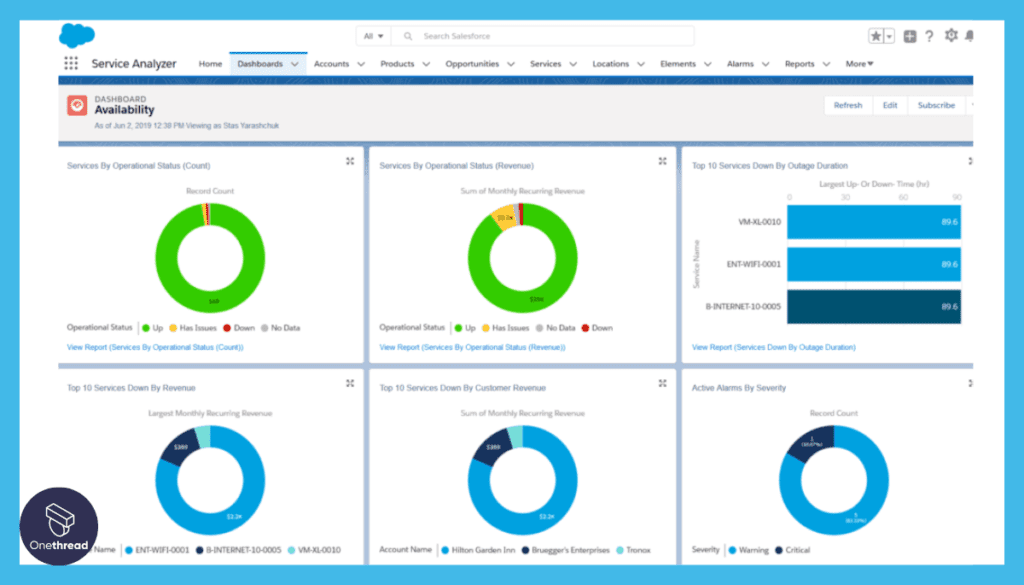
Einstein Analytics allows for predictive analytics, AI-driven insights, and customizable reporting for better decision-making.
Integration and Customization
Salesforce’s AppExchange and robust API enable extensive integration and customization possibilities, adapting to various business needs.
Community Engagement
Salesforce Community Cloud connects customers, partners, and employees for collaboration and engagement within branded communities.
Pricing & Plans:
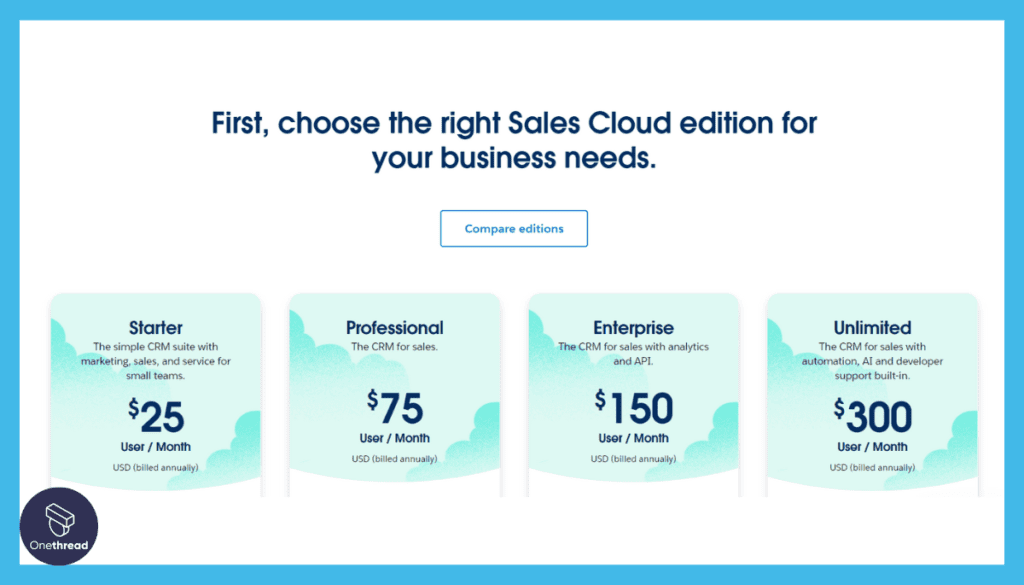
Salesforce offers various editions, such as Essentials, Professional, Enterprise, and Unlimited, with pricing ranging from $25 to $300 per user per month, depending on the features and scale required.
Pros:
- Extensive integration options with third-party apps
- Highly customizable to suit specific business needs
- Robust ecosystem with a large community and resources
Cons:
- Steeper learning curve for complex configurations
Customer Ratings
G2
- Rating: 4.2 out of 5 stars
Capterra
- Rating: 4.4 out of 5 stars
Review:
Salesforce has been praised for its rich feature set, scalability, and extensive integration possibilities. Many large enterprises value the ability to customize the platform to align with their unique business requirements.
Some common criticisms include the complexity of the platform, which may require dedicated resources to manage, and the potentially higher cost, especially when additional modules or extensive customization is required.
While Zoho often appeals to smaller businesses seeking simplicity and affordability, Salesforce tends to attract larger organizations aiming for depth and scalability in their CRM capabilities.
Is Salesforce Better than Zoho?
Salesforce and Zoho cater to different market segments with distinct features. Salesforce, with its robust functionality and customization, is often favored by larger enterprises seeking an extensive CRM solution.
Zoho, known for simplicity and affordability, tends to attract small to medium businesses. The preference for one over the other largely depends on a business’s scale, budget, and specific needs, making neither universally “better” but rather more suited to different scenarios and requirements.
#3. HubSpot
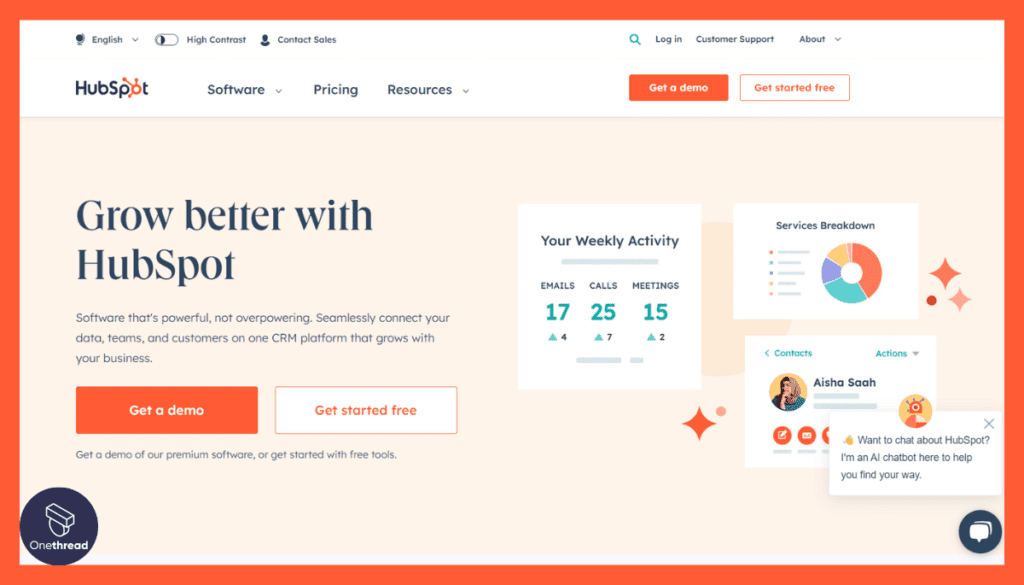
HubSpot is a comprehensive marketing, sales, and customer service platform designed to help businesses grow. It offers tools to attract visitors, convert leads, and close customers with its all-in-one inbound marketing functionalities. Features include email marketing, landing pages, social media management, SEO, analytics, and CRM integration.
HubSpot’s user-friendly interface enables teams to collaborate and automate workflows easily. It is highly customizable, allowing companies to tailor their strategies to target specific audiences.
The platform also provides detailed reporting and insights that help in making data-driven decisions. HubSpot’s emphasis on education and customer support, coupled with its versatile tools, makes it a preferred solution for businesses looking to enhance their marketing efforts.
Features
Marketing Automation
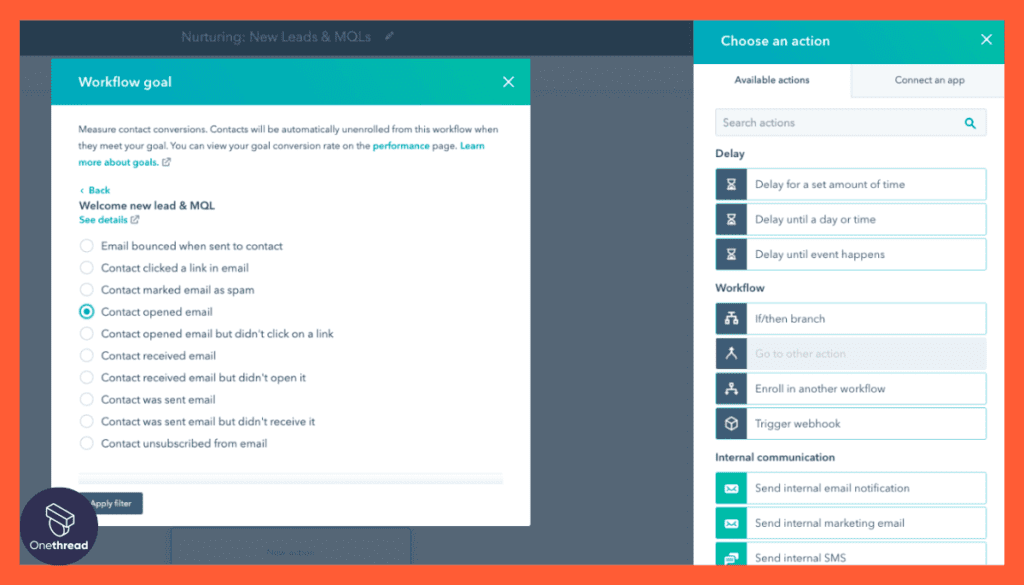
HubSpot offers advanced inbound marketing tools to attract, engage, and delight customers with content marketing, social media, SEO, and email campaigns.
Sales Automation
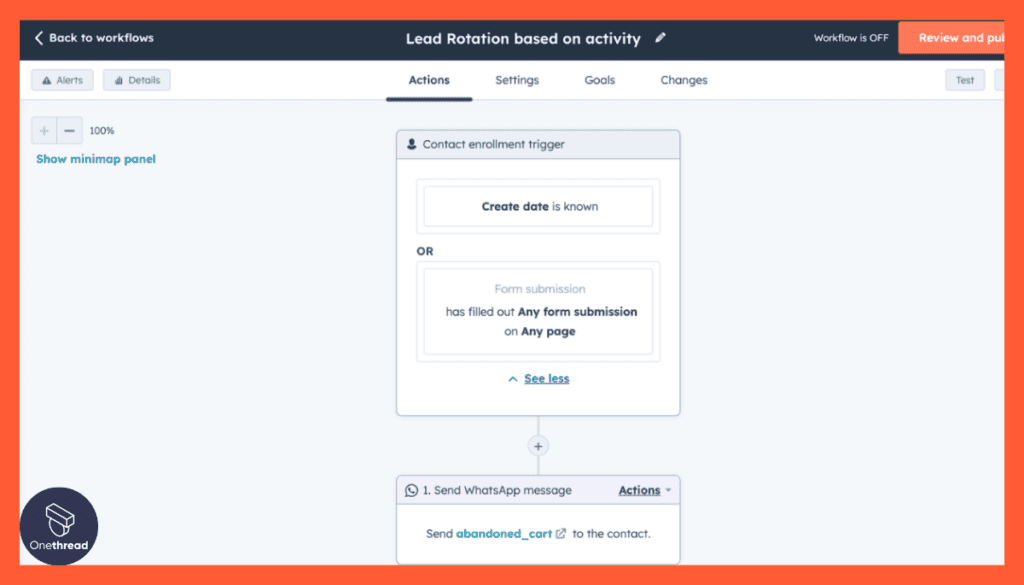
Sales Hub provides a range of tools to automate sales tasks and manage leads, opportunities, and sales pipelines.
Customer Service Hub
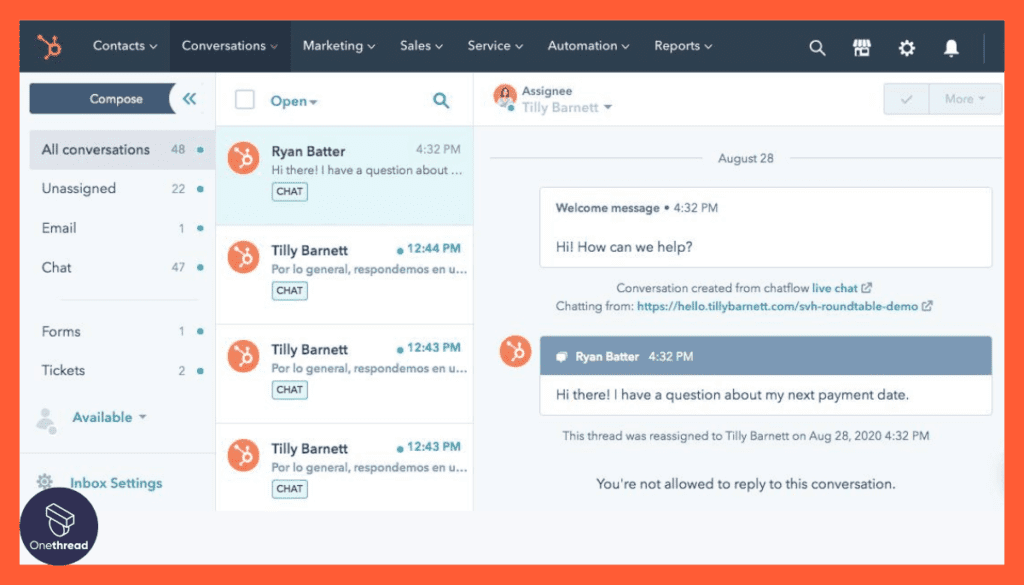
Service Hub helps businesses manage customer support tickets and feedback, creating a smooth customer service experience.
Content Management System (CMS)
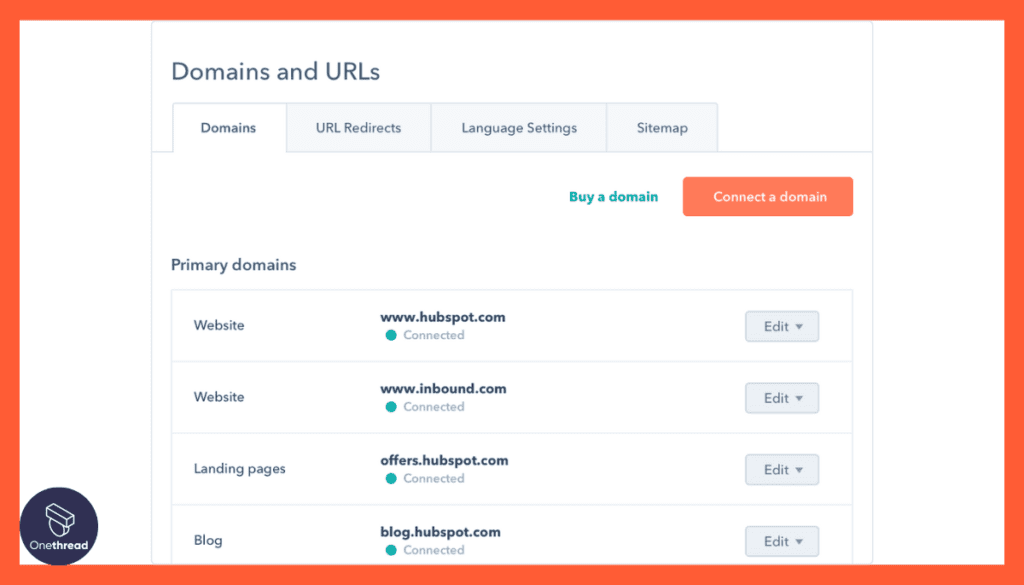
HubSpot’s CMS hub is a unified platform for website management, including blogging and landing page creation.
Reporting and Analytics
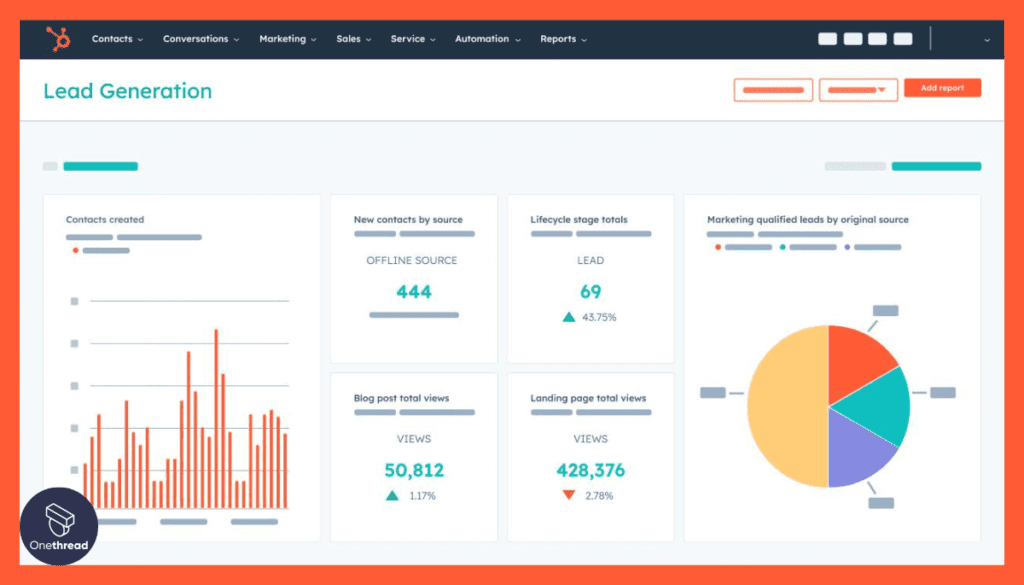
Detailed reporting and analytics tools allow businesses to gain insights into their sales, marketing, and service performance.
Integration
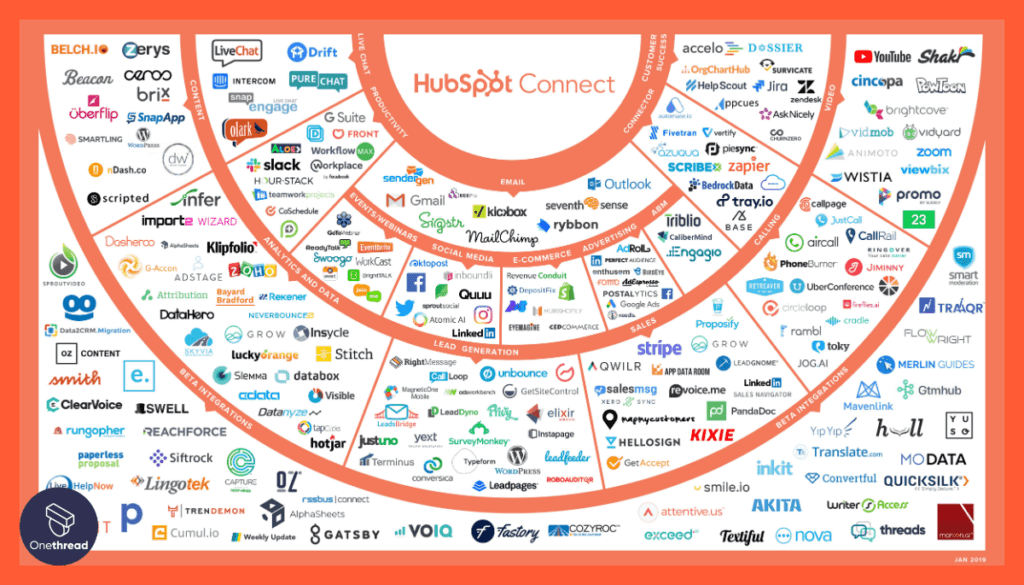
HubSpot offers a wide array of integrations with third-party apps and can be customized to fit specific business needs.
Pricing & Plans:
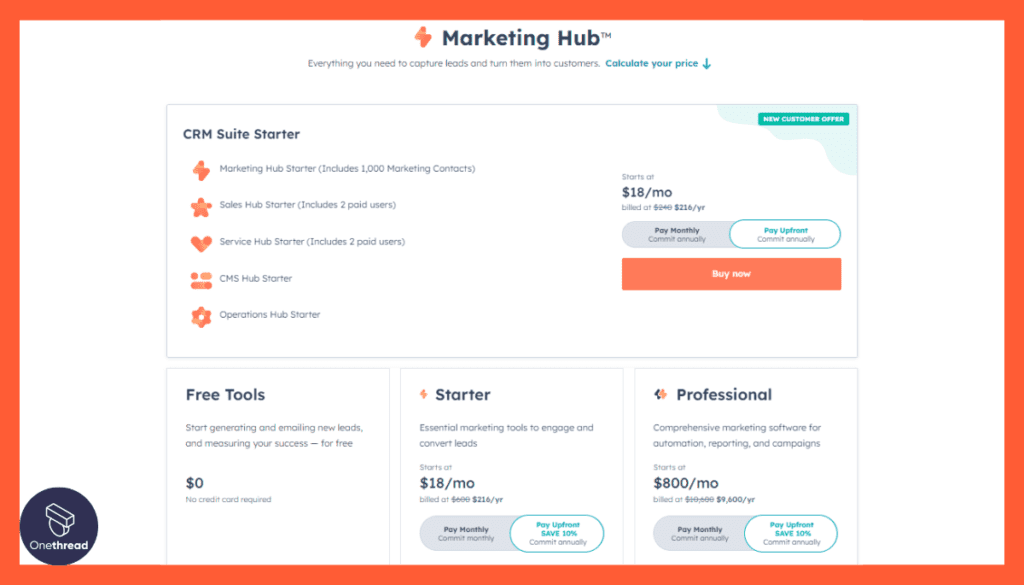
HubSpot offers a free CRM, with Marketing Hub, Sales Hub, and Service Hub plans starting at $50 per month each. Bundled plans are available too.
Pros:
- User-friendly interface and easy to get started
- Great for inbound marketing and content management
- Extensive knowledge base and customer support
Cons:
- Limited customization options in the free version
- Higher-tier plans can be expensive for small businesses
Customer Ratings
G2
- Rating: 4.3 out of 5 stars
Capterra
- Rating: 4.3 out of 5 stars
Review:
Positive reviews often emphasize HubSpot’s user-friendly design and effective inbound marketing tools. The platform is appreciated for its seamless integration between sales, marketing, and service hubs, allowing for a unified customer experience.
Some criticisms include the pricing model, which can become expensive with additional features and higher-tier plans. There are also occasional mentions of limitations in deep customization and integration with certain third-party tools.
Is HubSpot Better than Zoho?
HubSpot excels in inbound marketing and offers a user-friendly interface, making it a preferred choice for content-driven strategies. Zoho provides a comprehensive CRM solution with diverse functionalities, often appealing to businesses seeking robust customization.
The selection between HubSpot and Zoho depends on individual business needs, goals, and budget, with neither being universally “better,” but each possessing unique strengths that may align more closely with specific requirements.
#4. Microsoft Dynamics 365
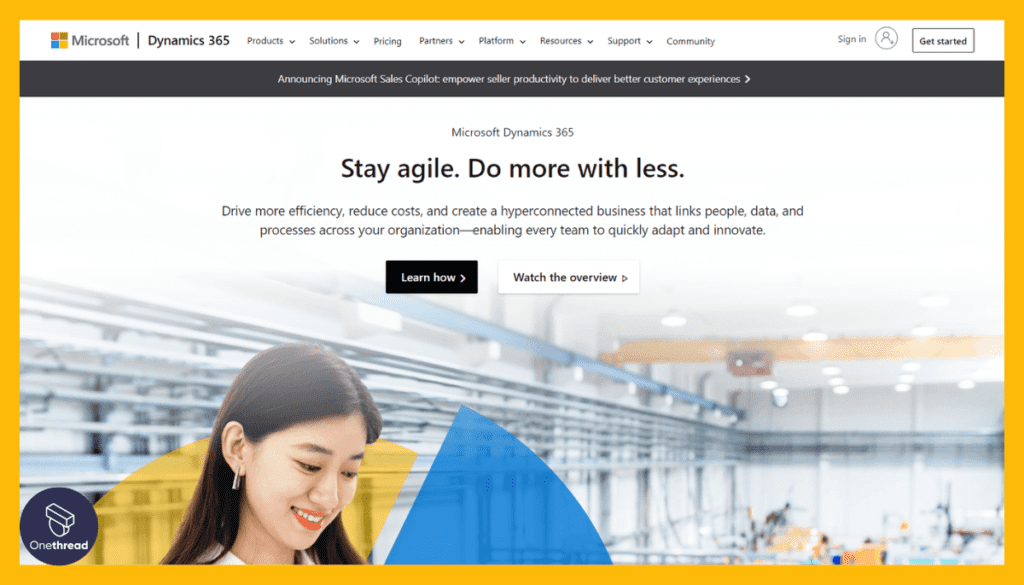
Microsoft Dynamics 365 is an integrated suite of business applications designed to streamline operations and enhance customer engagement. It combines CRM and ERP capabilities, allowing organizations to manage sales, marketing, service, finance, and operations in one unified platform.
With the power of AI, it offers insightful analytics and adapts to specific industry needs. Dynamics 365 provides a seamless experience across devices and applications, promoting collaboration among teams. Its flexibility allows customization to fit unique business requirements.
Integrations with other Microsoft products like Power BI, Office 365, and Azure enhance its functionality. Microsoft Dynamics 365’s ability to unify data and processes makes it a robust tool for businesses aiming to transform and grow efficiently.
Features:
Sales Automation
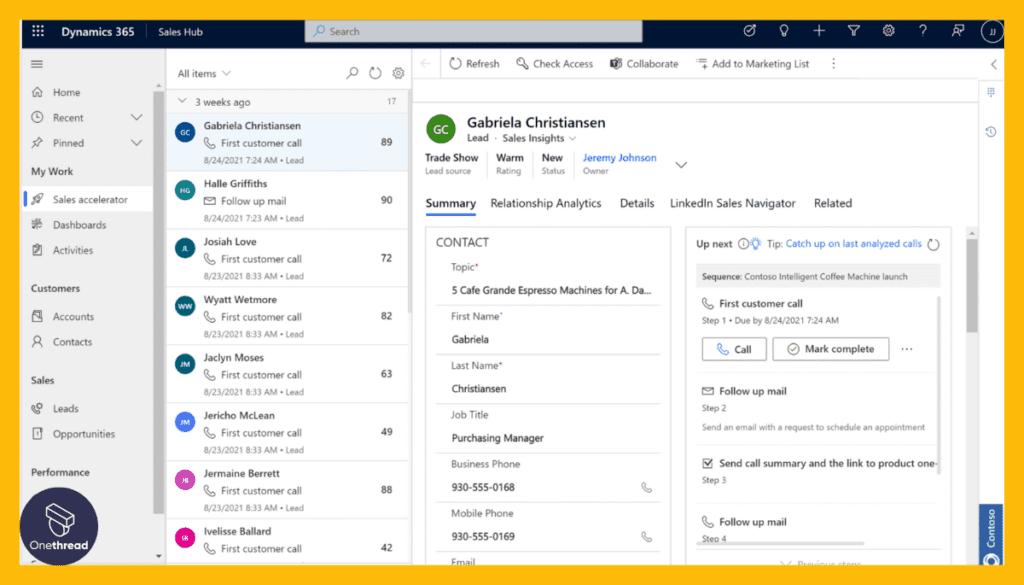
Microsoft Dynamics 365 for Sales provides insightful analytics, lead scoring, and opportunity management to drive sales performance.
Marketing Automation
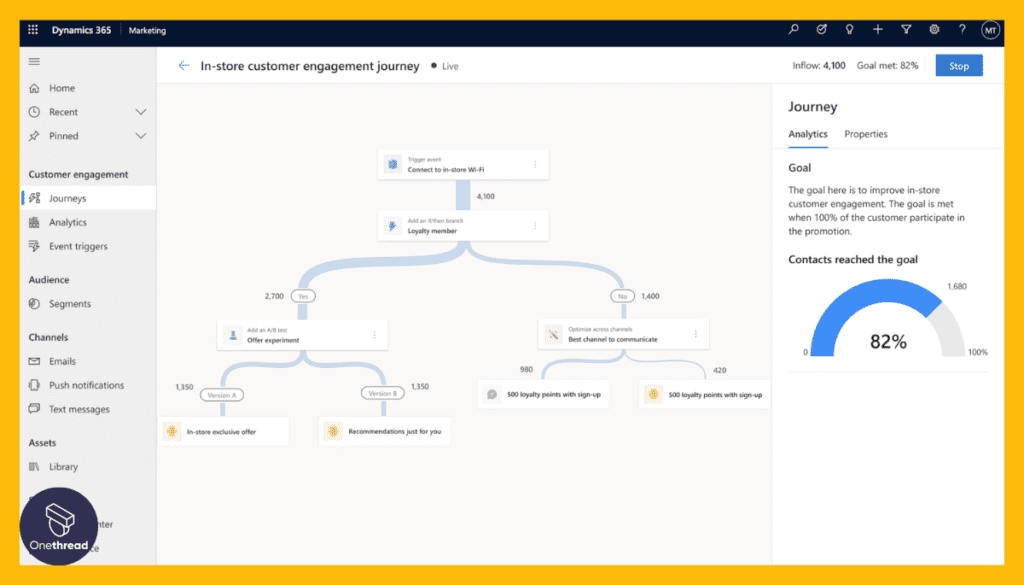
The Marketing module in Dynamics 365 helps businesses automate campaigns, nurture leads, and deliver personalized content across various channels.
Customer Service Management
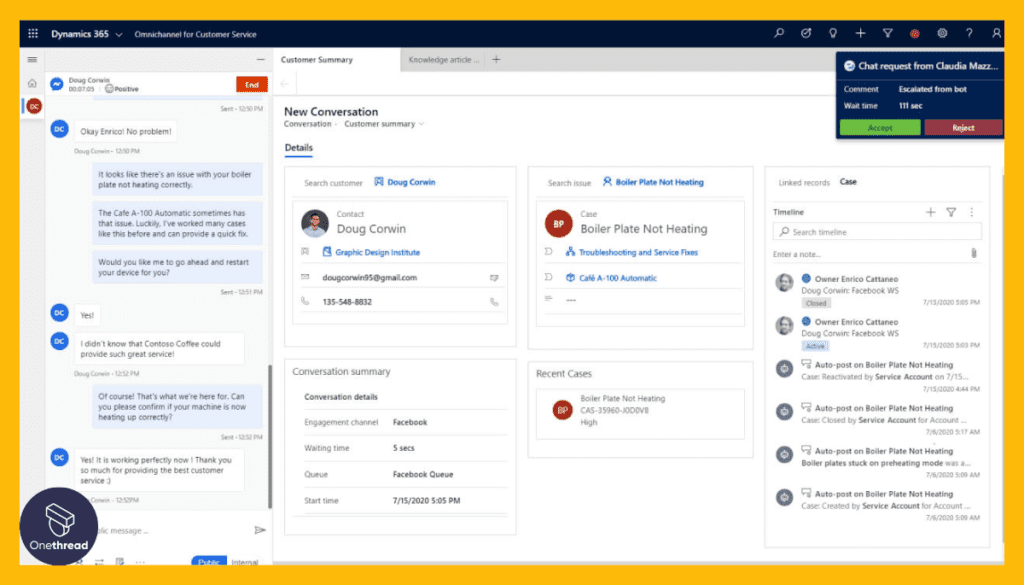
The platform offers tools to manage customer service requests, track issues, and deliver personalized service experiences.
Field Service Management
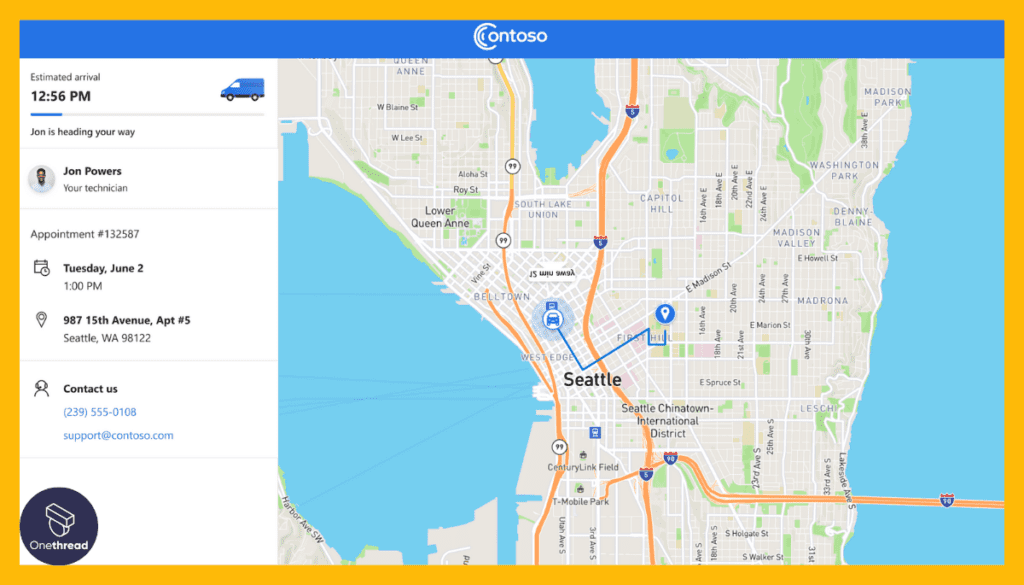
This unique offering helps in scheduling, managing, and delivering onsite service, including predictive maintenance.
Finance & Operations Management
With Dynamics 365, organizations can streamline finance, supply chain, and operational processes.
Integration & Customization
Dynamics 365 offers seamless integration with other Microsoft products and third-party applications, along with extensive customization capabilities.
Pricing & Plans:
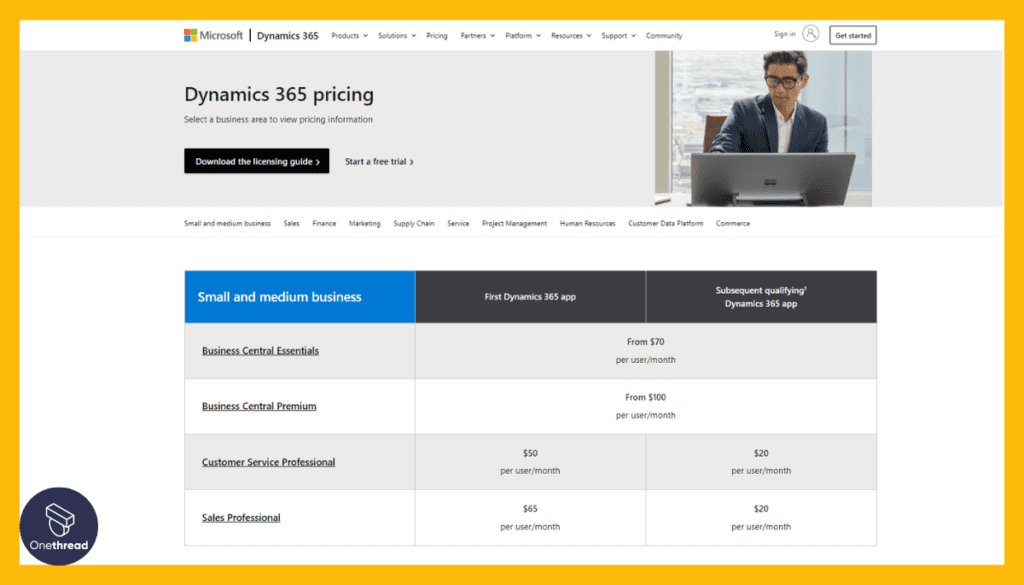
Microsoft offers different plans for each module, starting from $40 to $170 per user per month, depending on the functionalities required.
Pros:
- Seamless integration with the Microsoft ecosystem
- Extensive range of business applications in one platform
- Strong security and compliance features
Cons:
- Can be complex and overwhelming for smaller businesses
- Higher pricing for comprehensive solutions
Customer Ratings
G2
- Rating: 4.0 out of 5 stars
Capterra
- Rating: 4.2 out of 5 stars
Review:
Positive reviews for Microsoft Dynamics 365 often emphasize its strong integration with other Microsoft tools and the vast array of features available. It’s seen as a comprehensive solution for large enterprises in particular.
However, some users find the system complex and challenging to navigate, especially without proper training. Additionally, the cost might be prohibitive for smaller businesses.
Microsoft Dynamics 365 provides a wide array of tools and capabilities, making it a robust alternative to Zoho for larger organizations or those deeply embedded in the Microsoft ecosystem.
Is Microsoft Dynamics 365 Better than Zoho?
Microsoft Dynamics 365 offers extensive features, integration with Microsoft products, and robust customization, making it suitable for large enterprises. Zoho, on the other hand, provides a wide range of functionalities and a user-friendly interface that may be more appealing to small and medium businesses.
The choice between Microsoft Dynamics 365 and Zoho depends on business size, specific needs, and budget, with each platform having unique strengths aligned with different requirements.
5. Pipedrive
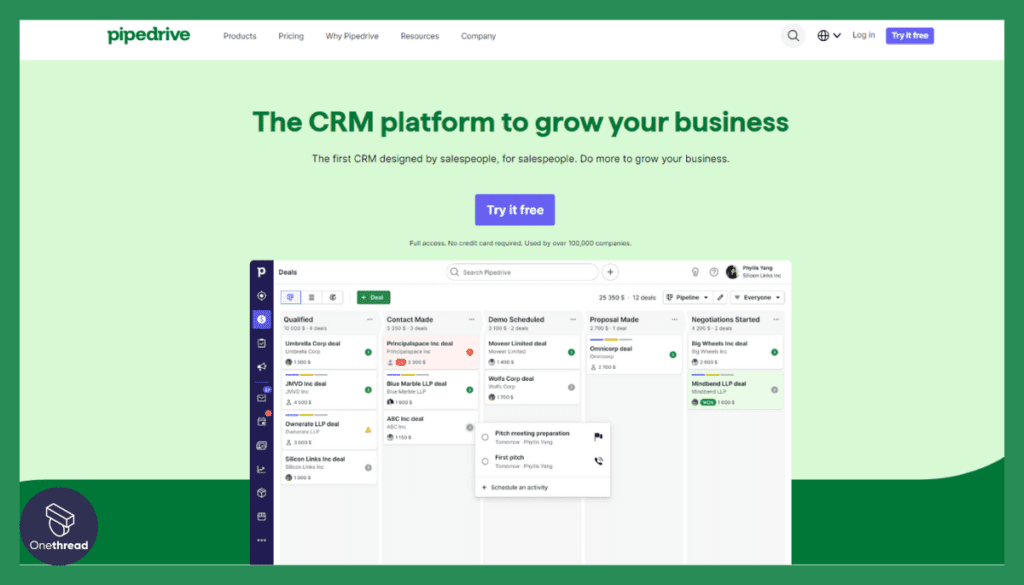
Pipedrive is a sales-focused Customer Relationship Management (CRM) tool designed to help sales teams manage leads and deals efficiently. It offers a visual sales pipeline, allowing users to view stages and progress at a glance.
With its easy-to-use interface, sales professionals can organize and prioritize tasks and follow-ups. Pipedrive integrates with various third-party applications, enhancing its capabilities. Its automation features reduce manual work, allowing the sales force to focus on closing deals.
Real-time performance analytics enable constant improvement. Pipedrive is customizable, catering to the specific needs of different businesses and industries. Its cloud-based structure ensures accessibility from any device, making it a preferred choice for many sales teams.
Features:
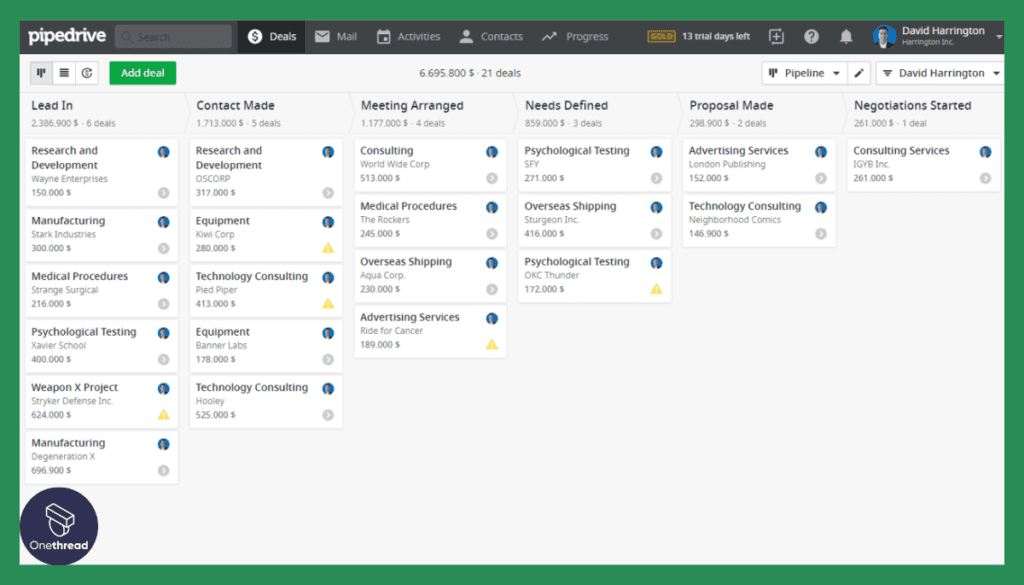
Sales Pipeline Management
Pipedrive excels in providing a visual sales pipeline that allows users to manage deals, track progress, and identify opportunities easily.
Lead Management
Capture, organize, and nurture leads with targeted communication, ensuring the conversion of prospects into loyal customers.
Email Integration & Automation
Pipedrive offers seamless integration with email providers and automation to track emails, schedule follow-ups, and streamline communication.
Performance Analytics
With customizable reports and dashboards, Pipedrive allows real-time tracking of sales performance and goals.
Mobile App
Pipedrive’s mobile app ensures that sales teams can access information and manage deals on the go, enhancing productivity.
Integration & Customization
It offers integration with a variety of third-party applications and allows customization to fit specific business processes.
Pricing & Plans:
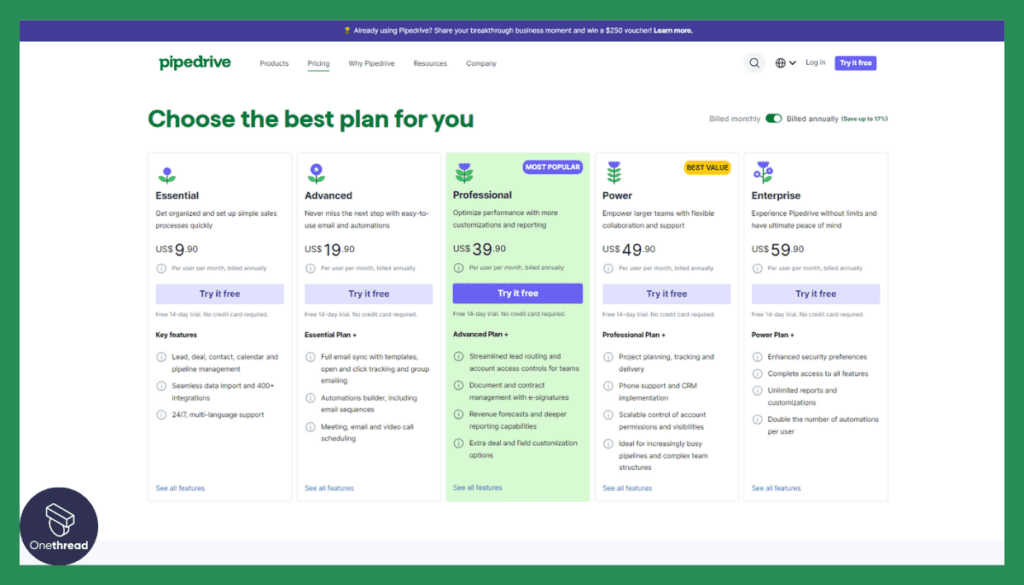
Pipedrive offers plans starting from $12.50 to $99 per user per month, with different features available at each level. There is also a free trial option.
Pros:
- Intuitive and easy-to-use interface
- Ideal for sales teams and deal tracking
- Affordable pricing for smaller businesses
Cons:
- Limited marketing and customer support features
- Not as comprehensive for non-sales activities
Customer Ratings
G2
- Rating: 4.3 out of 5 stars
Capterra
- Rating: 4.3 out of 5 stars
Review:
Pipedrive often point to its intuitive design, simplicity, and effectiveness in managing sales processes. Its visual interface and ease of use are highly appreciated, especially by small to medium-sized businesses.
Some criticisms include limitations in customization and a desire for more advanced features that are comparable to other comprehensive CRM platforms like Zoho.
Pipedrive is a focused, user-friendly CRM platform that emphasizes sales pipeline management. It is particularly appealing for small to medium-sized businesses looking for a straightforward, effective solution for sales management.
Is Pipedrive Better than Zoho?
Pipedrive excels in ease of use and visually appealing pipeline management, providing a streamlined experience for sales teams. While Zoho offers a broader set of features and extensive customization options, Pipedrive’s focus on sales processes and lead management can be more suitable for those prioritizing simplicity.
The choice between Pipedrive and Zoho may come down to the specific needs and preferences of a business or team.
#6. Freshsales
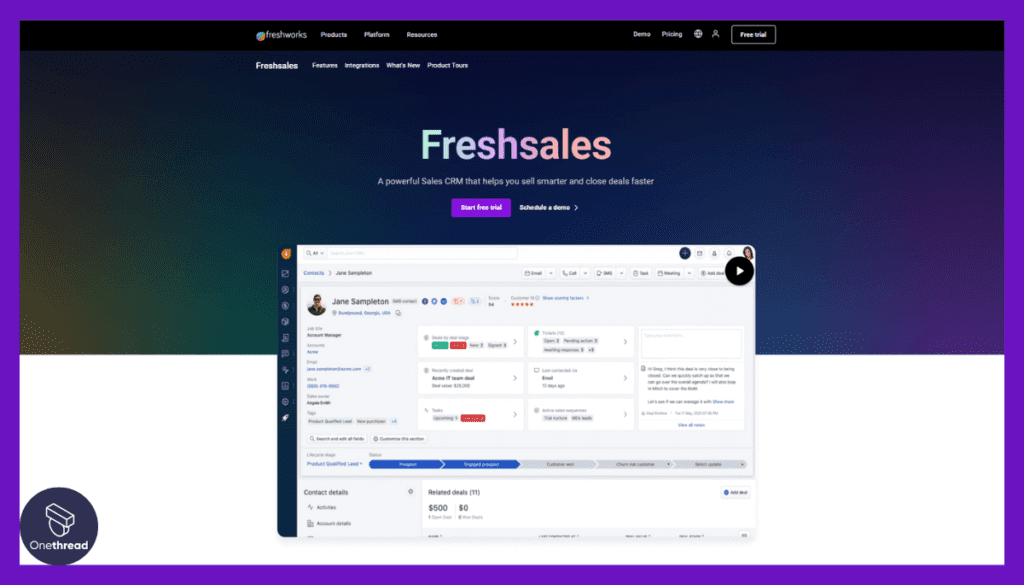
Freshsales is a dynamic Customer Relationship Management (CRM) software designed to streamline sales processes. Created by Freshworks, it offers features like lead scoring, email tracking, and sales analytics. The intuitive interface allows sales teams to capture and organize leads, prioritize follow-ups, and monitor deals in different stages.
Its automation capabilities save time by performing repetitive tasks, and integration with other tools enhances its functionality. Freshsales also provides detailed insights into customer behavior, enabling personalized interactions.
With mobile support and cloud accessibility, it ensures seamless operations across various devices. Freshsales’ scalability and customization make it suitable for businesses of all sizes, offering them a comprehensive solution to drive sales growth.
Features:
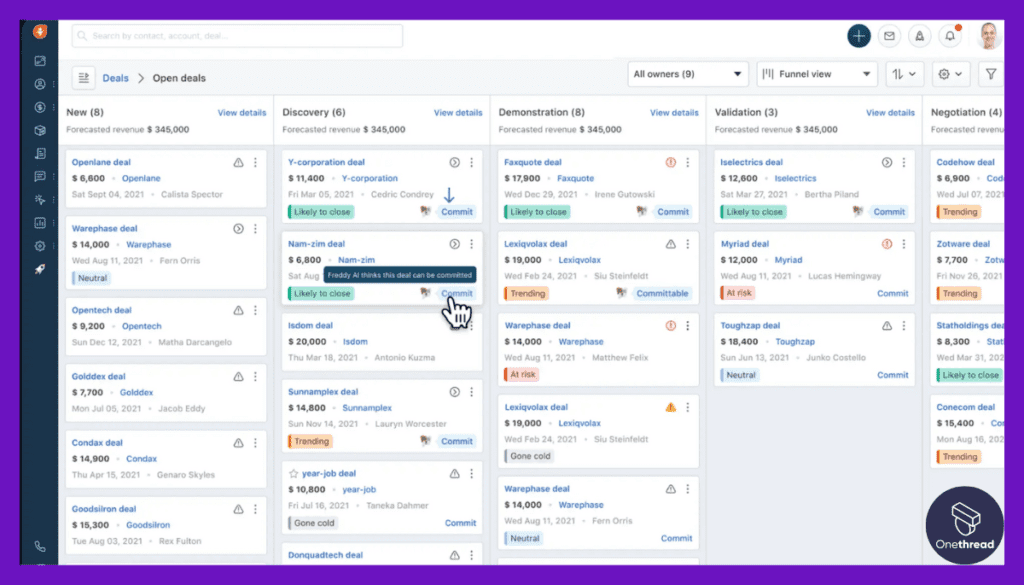
AI-based Lead Scoring
Freshsales uses artificial intelligence to assign scores to leads based on their likelihood to convert, aiding in prioritization and focusing on high-potential prospects.
Email Tracking & Automation
With seamless email integration, Freshsales allows tracking of email opens and clicks and automates follow-up emails for more efficient communication. Freshsales integrates with various third-party applications and fosters collaboration among team members through shared notes, tasks, and documents.
Sales Pipeline Management
Visual sales pipelines enable users to manage and monitor deals, identify bottlenecks, and streamline the sales process.
Built-in Phone & SMS
It offers built-in phone and SMS functionality, allowing sales teams to call or message leads directly from the platform.
Performance Analytics
Customizable dashboards and reports provide insights into sales performance, team productivity, and customer behavior.
Pricing & Plans:
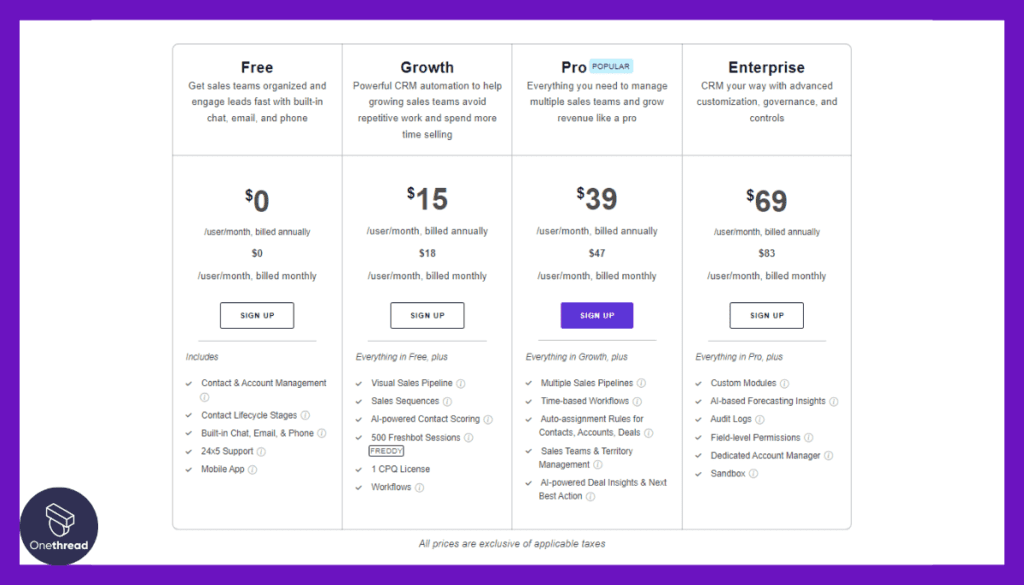
Freshsales offers plans starting from $12 to $79 per user per month, with various features included at different levels. There is also a free plan available with limited capabilities.
Pros:
- Intuitive user interface and easy to navigate
- Strong email and sales automation capabilities
- Good customer support and knowledge base
Cons:
- Some advanced features only available in higher-tier plans
- Integrations with third-party apps may be limited
Customer Rating
G2
- Rating: 4.2 out of 5 stars
Capterra
- Rating: 4.5 out of 5 stars
Review:
Positive reviews often highlight Freshsales’ user-friendly interface, strong analytics, and powerful automation capabilities. The built-in phone functionality is also a standout feature.
Some criticisms include occasional software glitches and a desire for more advanced customization options, particularly when compared to extensive platforms like Zoho.
Freshsales presents itself as a comprehensive yet user-friendly CRM option that offers a good balance between functionality and ease of use. Its focus on sales automation, AI-based lead scoring, and integrated communication tools make it a noteworthy alternative to Zoho, especially for businesses that value streamlined sales processes and modern design.
Is Freshsales Better than Zoho?
Freshsales stands out for its intuitive design and AI-based lead scoring, focusing on streamlined sales processes. Zoho, on the other hand, offers extensive customization and a broader feature set.
The decision between Freshsales and Zoho could be influenced by factors like the desired level of complexity, the need for specialized features, and budget considerations. Both platforms offer valuable CRM solutions, catering to different needs and preferences.
#7. Bitrix24
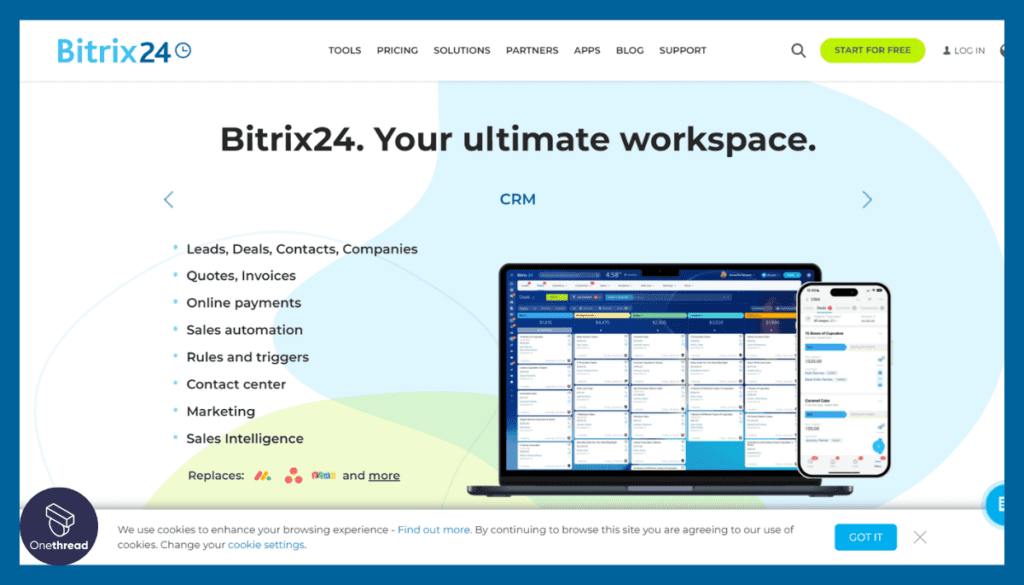
Bitrix24 is an extensive collaboration platform designed for businesses of all sizes. It offers a unique combination of CRM, project management, and internal communication tools.
With Bitrix24, teams can manage leads, sales, and invoices while also coordinating on projects using Gantt charts, task dependencies, and time tracking. The platform encourages collaboration through social intranet features, video conferencing, and real-time chats.
Document management is streamlined with secure file sharing and editing capabilities. Bitrix24’s highly customizable interface can be tailored to fit specific business needs, and its cloud-based or on-premises options provide flexibility. By bringing multiple functionalities together, Bitrix24 serves as a unified workspace that fosters efficiency, teamwork, and growth.
Features:
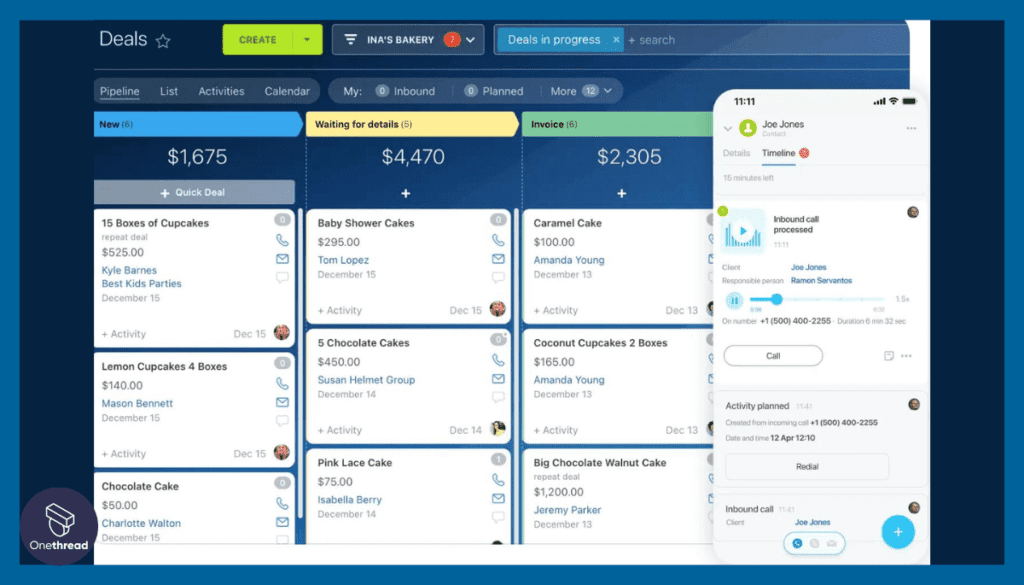
Collaborative Tools
Bitrix24 fosters teamwork and communication with features like social intranet, chat, video conferencing, and document sharing. Bitrix24 includes tools for employee management, work reports, absence chart, and workforce management.
CRM System
Bitrix24 offers a robust CRM system with features for managing leads, contacts, deals, and invoices. It also includes marketing automation and sales funnels.
Task & Project Management
This platform provides task tracking, project management, and time tracking. Gantt charts, Kanban view, and workload planning make managing projects efficient.
Contact Center
Integrated telephony, live chat, and social networking interfaces allow businesses to communicate with customers seamlessly.
Pricing & Plans:
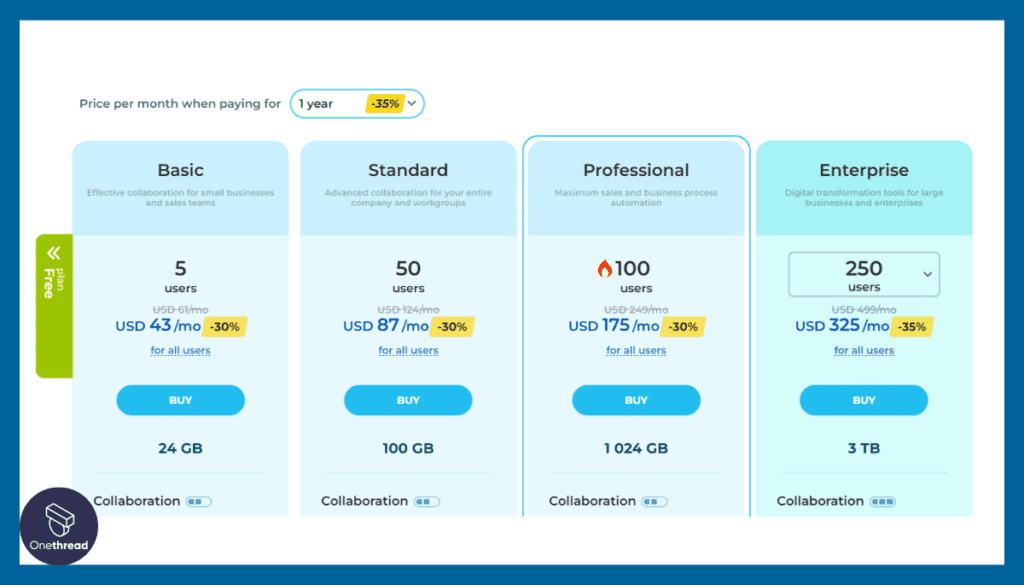
Bitrix24 offers a free version with limited features, and premium plans range from $19 to $159 per month, depending on the number of users. There is also an on-premise version available for larger organizations.
Pros:
- Wide array of features beyond CRM functionality
- Suitable for small to medium-sized businesses
- Affordable plans for larger teams
Cons:
- Learning curve due to the abundance of features
- The free version has significant limitations
Customer Ratings
G2
- Rating: 4.0 out of 5 stars
Capterra
- Rating: 4.0 out of 5 stars
Review:
Bitrix24 often focus on its extensive features, including task management, CRM, and collaboration tools. The platform’s all-in-one nature is praised by many users.
However, some criticisms revolve around the complexity and steep learning curve, especially for those who are new to such comprehensive tools. Some users also mention that the mobile app could use improvements.
Is Bitrix24 Better than Zoho?
Bitrix24 offers an all-in-one collaboration platform with extensive CRM, task management, and HR tools, making it appealing to those looking for comprehensive solutions. Zoho provides broader customization options and a diverse range of business apps.
The choice between Bitrix24 and Zoho depends on the specific needs, such as the desire for a unified platform or more tailored solutions. Each caters to different preferences and business requirements, offering distinct strengths in their respective areas.
#8. SugarCRM
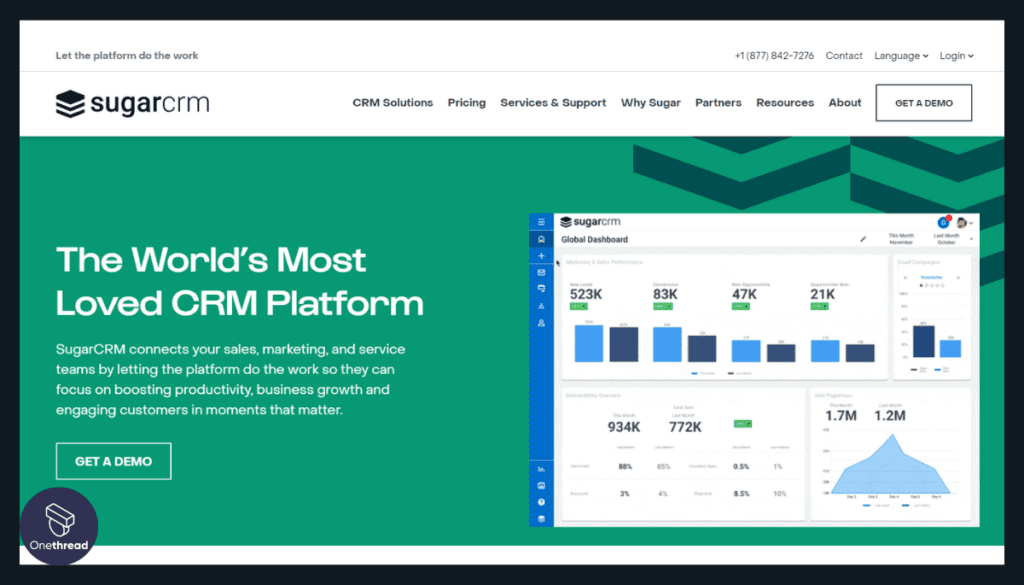
SugarCRM is a customer relationship management (CRM) software designed to streamline sales, marketing, and support processes. Offering a comprehensive view of each customer, it helps businesses manage leads, opportunities, accounts, and customer support with ease.
The platform’s automation features enable efficient workflow management, while its robust analytics provide insights into performance and trends. SugarCRM offers customization options, allowing businesses to tailor the platform to their specific needs and industry requirements.
With integration capabilities with other tools and systems, it serves as a central hub for all customer interactions. Available in various editions to suit different business sizes and requirements, SugarCRM emphasizes a user-friendly approach that aims to enhance customer relationships and drive growth.
Features:
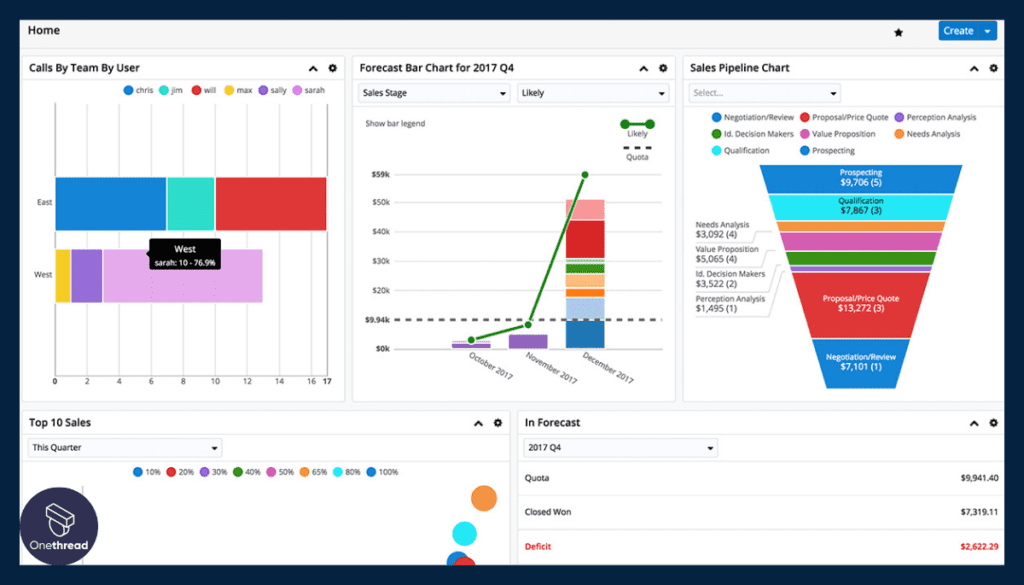
Sales Automation
SugarCRM provides robust sales force automation, including opportunity and lead management, forecasting, and pipeline management. SugarCRM offers extensive third-party integration options and robust customization capabilities to match the unique business processes.
Marketing Automation
With targeted campaigns, email marketing, and lead nurturing, SugarCRM ensures a smooth marketing process.
Customer Support and Service
Equipped with case management, support portals, and knowledge base integration, SugarCRM enhances customer service experiences.
Reporting and Analytics
Advanced reporting tools and predictive analytics provide insightful data and actionable intelligence.
Pricing & Plans:
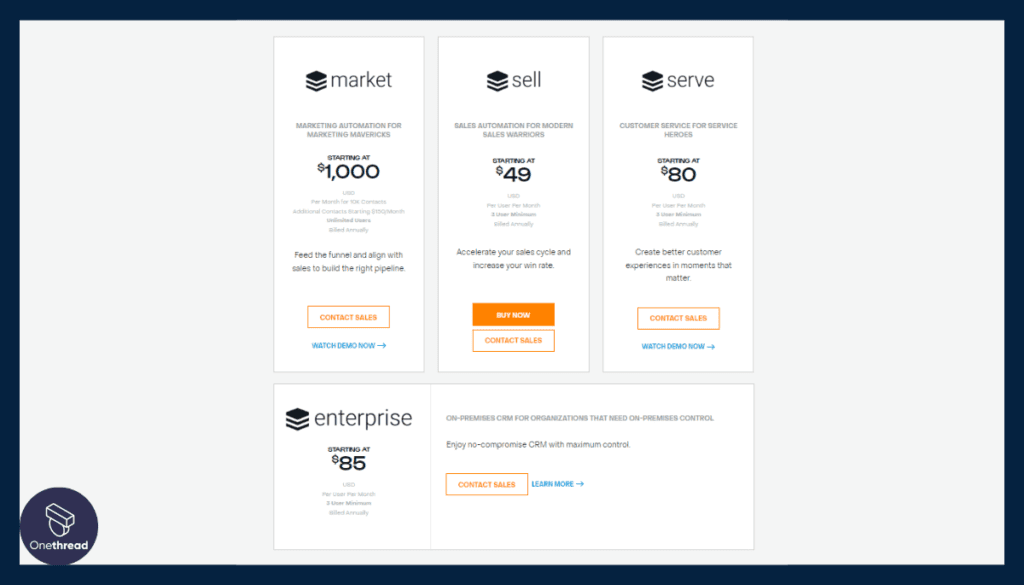
SugarCRM offers various editions, including a free open-source version and paid plans start from $40 per user per month. The cost can vary based on customization and support requirements.
Pros:
- Highly customizable to fit unique business needs
- Active community and extensive third-party integrations
- Scalable for growing businesses
Cons:
- Setting up and customizing can be time-consuming
- Some advanced features may require technical expertise
Customer Ratings
G2
- Rating: 4.0 out of 5 stars
Capterra
- Rating: 4.2 out of 5 stars
Review:
SugarCRM often focus on its powerful customization options and integration capabilities. Users appreciate the flexibility it provides to fit their unique business needs.
Criticism tends to revolve around the user interface, which some users find to be less intuitive, and the pricing structure, which might be considered expensive for smaller businesses.
Feature Comparison Of Zoho Competitors At A Glance
Here’s a concise feature comparison chart of Zoho and its competitors at a glance:
Tool | CRM Functionality | Marketing Automation | Reporting & Analytics | Integration Capabilities |
 | Lead & Contact Management | Email Campaigns | Custom Dashboards | API, Third-Party Apps |
 | Lead & Contact Management | Email Campaigns | Custom Dashboards | Limited |
 | Lead & Contact Management | Email & Social Marketing | Customizable Reports | API, AppExchange Marketplace |
 | Contact & Pipeline Management | Content & Email Marketing | Custom Reports | API, Third-Party Integrations |
 | Sales Pipeline Management | Email & Social Marketing | Sales Analytics | API, Various Integrations |
 | Sales Pipeline Management | Drip Campaigns | Customizable Reports | API, Various Integrations |
 | Contact Management | Email Marketing | Sales Analytics | API, Marketplace Apps |
 | Sales Automation | Social & Email Marketing | Visual Reports | API, Third-Party Integrations |
 | Sales & Service Automation | Campaign Management | Advanced Analytics | API, Extensible Platform |
Choosing The Best Zoho Alternative
Choosing the best Zoho alternative largely depends on your specific business needs, priorities, and budget. Here are some considerations to keep in mind when evaluating alternatives:
Identify Your Needs: Clearly define what you want the software to accomplish. Consider the tasks you’ll be performing regularly and look for software that makes these tasks easier.
Consider the Scale: Consider the size of your business and how much you’re likely to grow in the future. Some tools are better suited for small businesses, while others can scale up for large enterprises.
Integration Capabilities: Ensure the software you choose can integrate well with the other tools you’re already using in your business. This will streamline your workflows and increase productivity.
Ease of Use: It’s essential to choose software that’s user-friendly and intuitive, or you may end up wasting time figuring out how to use it. Check if the software offers a trial or demo so you can evaluate its usability.
Customer Support: Reliable customer support can be a lifesaver when you encounter issues. Look for software that provides prompt and effective customer service.
Budget: Be clear about how much you’re willing to spend. Compare the pricing of different software and make sure it fits within your budget.
Reviews and Ratings: Look at the reviews and ratings of the software by other users, particularly those in the same industry as you. This can provide valuable insights into the software’s pros and cons.
In conclusion, there isn’t a one-size-fits-all answer to the best Zoho alternative. It’s about finding the software that fits your business’s unique needs and requirements.
Conclusion
Choosing the right business management tool is crucial for any business, big or small. While Zoho provides an extensive suite of applications that caters to various business needs, it may not always be the perfect fit for every organization.
Alternatives like Onethread, Salesforce, Microsoft Dynamics 365, HubSpot, Slack, Freshworks CRM, Asana, Trello, QuickBooks, Zendesk, and Google Workspace each bring unique features to the table, offering different advantages based on your specific business needs and budget.
Ultimately, the best Zoho alternative for your organization depends on your operational requirements, existing software ecosystem, expected scalability, and budget. By taking time to evaluate these aspects, businesses can identify a software solution that will help streamline operations, boost productivity, and drive growth.
FAQs
Are Zoho alternatives more expensive?
Not necessarily. The cost of Zoho alternatives can vary widely, with some offering basic features for free, and others offering more advanced features at a higher cost. It’s best to compare pricing models and plans of different platforms based on your specific needs.
Can Zoho alternatives integrate with other software I use?
Many Zoho alternatives offer robust integration capabilities with other software. However, the extent and ease of integration can vary from one platform to another, so it’s essential to review this aspect before making a decision.
How do I choose the best Zoho alternative for my business?
Identify your specific business needs, consider the size and growth potential of your business, check the integration capabilities with your existing software, evaluate the ease of use, look at the quality of customer support, compare pricing, and review user feedback and ratings to make an informed decision.
Are Zoho alternatives user-friendly?
User-friendliness can vary among Zoho alternatives. Platforms like HubSpot and Google Workspace are often praised for their intuitive interfaces, but it’s a good idea to try out a demo or take advantage of a free trial period to see if the platform suits your needs.
